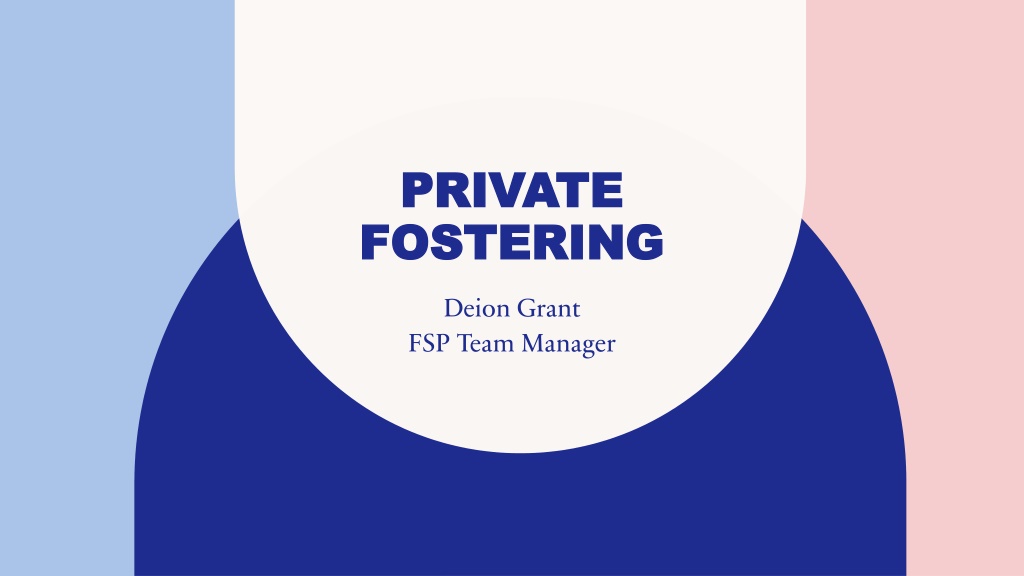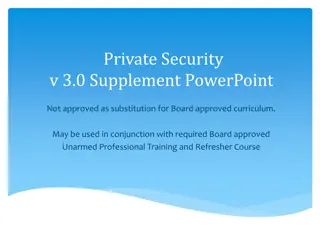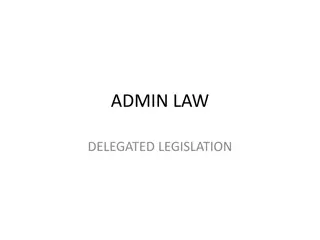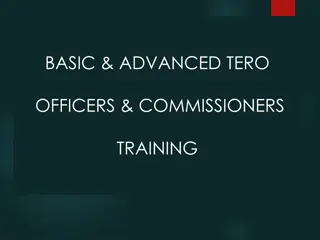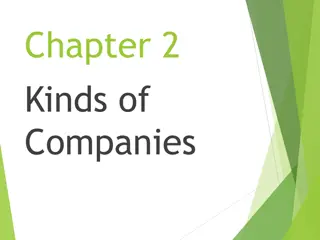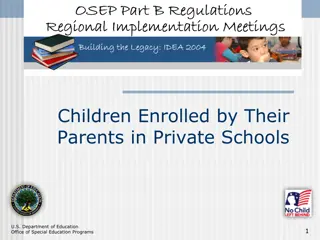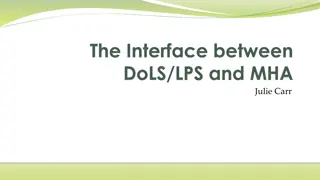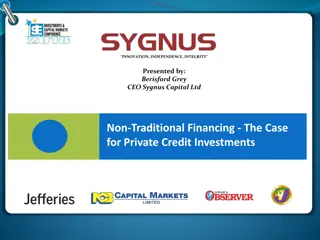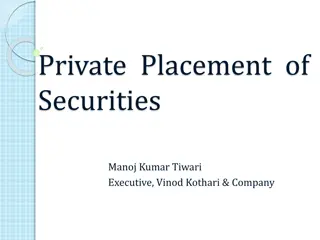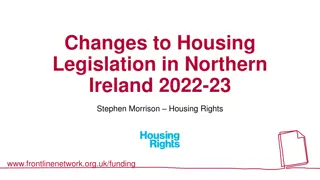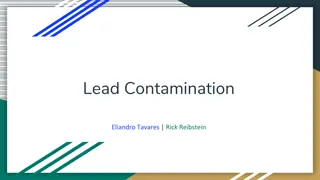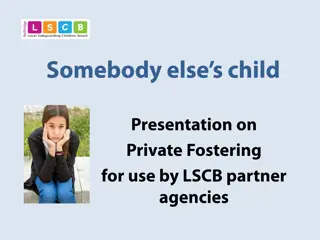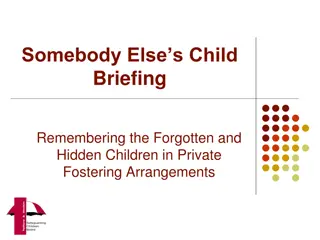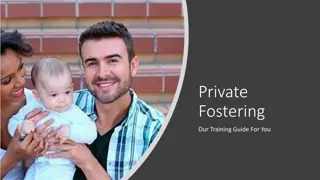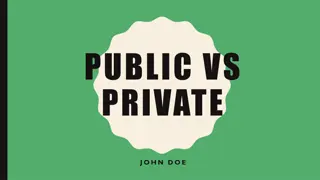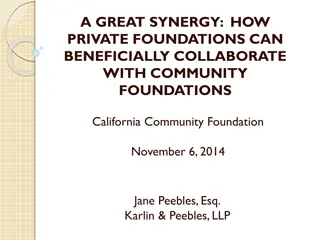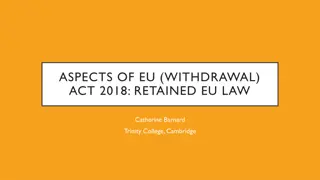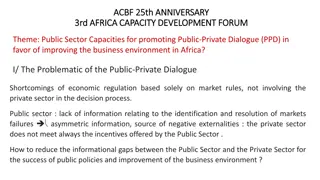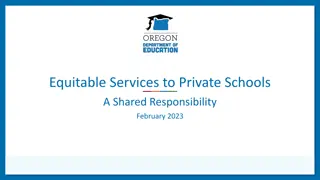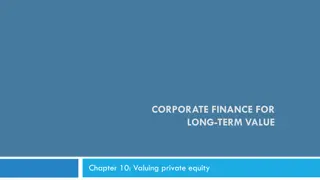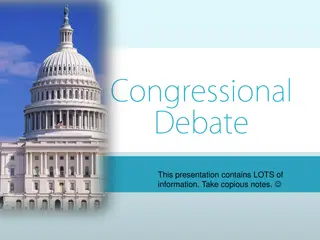Understanding Private Fostering and Legislation
Private fostering is when a child under 16 (or 18 with a disability) is cared for by someone other than their parent or a connected person for 28 days or more. Legislation changed after the case of Victoria Climbie, requiring proactive investigation by local authorities. Private foster carers do not have parental responsibility, making contact with parents essential.
Uploaded on Sep 14, 2024 | 0 Views
Download Presentation

Please find below an Image/Link to download the presentation.
The content on the website is provided AS IS for your information and personal use only. It may not be sold, licensed, or shared on other websites without obtaining consent from the author. Download presentation by click this link. If you encounter any issues during the download, it is possible that the publisher has removed the file from their server.
E N D
Presentation Transcript
PRIVATE PRIVATE FOSTERING FOSTERING Deion Grant FSP Team Manager
AGENDA AGENDA What is your understanding What is Private Fostering & Legislation Who are not considered Private Foster Carers. Common reasons by Private Fostering happens. Questions to ask to be sure. Responsibilities of Parents and Private Foster Carer s Local Authorities responsibilities. Any questions?
Presentation title 3 WHAT IS YOUR WHAT IS YOUR UNDERSTANDING OF UNDERSTANDING OF PRIVATE PRIVATE FOSTERING? FOSTERING?
Private fostering is an arrangement whereby a child under the age of 16 (or 18 if the child has a disability) ( S.66 Children Act 1989 ) is placed for 28 days or more in the care of someone who is not the child s parent (s) or a connected person . A connected person is defined as a relative, friend or other person connected with a child (Regulation 24 (3) The Care Planning, Placement and Case Review (England) Regulations 2010 )
The law regarding private fostering changed greatly following the death of Victoria Climbie in 2000 who was privately fostered by her Great Aunt. Legislation introduced after Victoria s death requires local authorities to be proactive in investigating potential private fostering arrangements.
Presentation title 6 WHO WOULD NOT BE WHO WOULD NOT BE CONSIDERED AS A PRIVATE CONSIDERED AS A PRIVATE FOSTER CARER? FOSTER CARER?
Presentation title 7 A parent Grandparent Aunt Uncle Stepparent (including civil partnerships) Sister or brother To be private fostering, the arrangement has not been made by the local authority, and the child or young person is not being looked after by an approved foster carer
Presentation title 8 PRIVATE FOSTER CARERS DO NOT HAVE PR. PARENTS RETAIN PR. THAT S WHY MAKING CONTACTING WITH PARENT IS ESSENTIAL.
Common situations in which children are privately fostered include: 9 Children with parents or families overseas Children with parents working or studying in the UK Asylum seekers and refugees Local children living apart from their families Adolescents and teenagers Children attending language schools Children at independent boarding schools who do not return home for holidays Children brought in from abroad with a view to adoption
Presentation title 10 IMPORTANT TO ASK QUESTIONS! IMPORTANT TO ASK QUESTIONS! Why is asking questions important? What type of questions do you think you should ask?
RESPONSIBILITIES RESPONSIBILITIES 11 PRIVATE FOSTER CARER PARENT Should advise Tower Hamlets Council of any proposed arrangement at least six weeks before a private foresting arrangement is due to begin. Notify the Duty Team within 48 hours that the arrangement has begun for example the child has arrived. Provide the private foster carer with as much information about the child as possible, including their health and school history, their interests, religion, dietary needs etc. Make appropriate financial arrangements for the child Participate in major decisions which affect the child in their care. Advise Tower Hamlets Council of any proposed arrangement at least six weeks before it is due to begin Notify the Council within 48 hours that the arrangement has begun for example the child has arrived. Notify the Council when the child leaves their care and provide details of the child s new care arrangements Provide day to day care and promote the child s welfare. Participate in checks carried out by the Local Authority.
12 LOCAL AUTHORITIES LOCAL AUTHORITIES DUTY DUTY MASH records notifications. MASH will do some initial screening. Case gets transferred to FSP once placement has been for more than 28 days. Assessment on child is carried out by FSP. Assessment of adults/Private Foster Placement is carried out by Fostering. Child will be made subject to CIN processes until 16 or 18 is there are any significant disabilities. And if child returns back to parents. Raise awareness within the community.
Presentation title 13 ANY QUESTIONS? ANY QUESTIONS?
